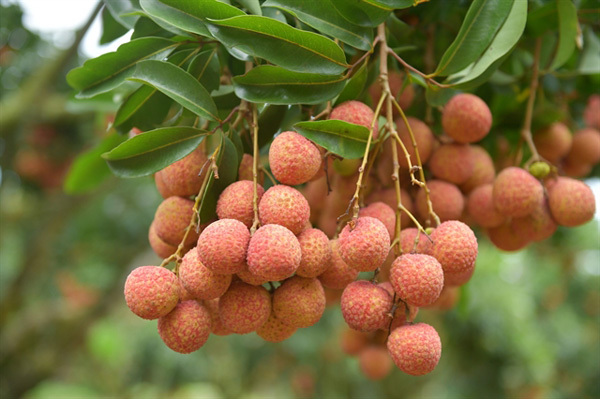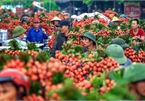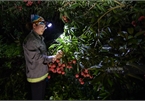 |
| Lychee is grown organically in Luc Ngan District, the northern province of Bac Giang. — Photo vietnamplus.vn |
The district is famous for its orchards of orange, grapefruit, apple, custard apple and especially lychee.
Experienced lychee traders have said that Luc Ngan lychees were first exported to China in 1997, mostly dried lychee which Chinese people add to their tea.
It took 2000 with widely available freezing technology and better transportation for fresh lychee to enter the world’s biggest market with a population of more than 1 billion.
Now Global Good Agriculture Practices (GlobalGAP), lychees can approach demanding markets like Japan, Australia and the EU.
This year marks the first time Luc Ngan’s fresh lychees are exported to Japan while in the past, only processed lychee like dried lychee, soaked lychee or lychee juice could enter the country.
In Japan, a packet of 12 Vietnamese lychees can sell for VND200,000 (US$8.7) or nearly VND17,000 each – much more expensive than the lychees sold in the domestic market which are usually VND25,000 – 35,000 ($1.09- 1.52) per kilo.
Lychee is now a product that can help farmers become prosperous.
Known as a “witch” among lychee growers in Luc Ngan District, farmer Tran Van Hanh of Giap Son Commune was among the first to grow organic lychees in the locality.
Hanh said his family and about 20 other households last year joined a programme in which lychee was grown under strict criteria such as safe for growers, not harming the environment and no residue of plant protection products on the fruits, resulting in tastier fruits.
“To meet such criteria, the lychee plants need to be nursed carefully with proper watering and irrigation,” Hanh said, adding that he also installed cameras and used an e-diary to observe his orchards.
“Growing organic lychees requires more investment in fertiliser, water and farming techniques than non-organic methods, so the former could be much more expensive than the latter,” Hanh said.
In 2012, Hanh was well known for a new farming technique that helps improve the productivity and quality of Luc Ngan lychee after finding that if lychee plants were allowed to develop their height and foliage, the fruits would not receive enough sunlight, affecting the fruits’ sweetness.
Thus, Hanh cut small branches, said to be a bold move.
Surprisingly, buds arose from the plants’ stems, producing massive flowers which then developed fruits, Hanh said, adding that productivity increased and the fruits looked and tasted better than in previous years.
“With the new technique, our productivity increased by 20 per cent. Moreover, when the fruits are developed along the plants’ stems at a lower height, we can harvest fruits more easily and thus, save labour,” Hanh said.
Since then Hanh’s family usually harvests about 30 tonnes of lychees from their 3ha orchard annually, with each kilo going for at least VND25,000, he said.
“Hearing about lychees developing along plants’ stems, wholesalers visited and bought our lychee. My family’s financial situation has improved a lot thanks to the lychee,” Hanh said.
Cao Van Hoan, the vice secretariat of Luc Ngan District’s Party Committee, said that last year, organic lychee was grown in 20ha with the productivity of about 200 tonnes.
“Organic lychee is 3-7 times more expensive than conventional lychee,” Hoan said.
This year, the district maintained its organic lychee area and expanded the cultivation area that applied VietGap and GlobalGap, Hoan said.
He said 2019 also marked the first time lychee growers and companies worked together on organic lychee production and consumption.
Experienced farmers and high-quality orchards are selected to join the organic lychee programme. Harvested fruits are carefully selected, packed in paper boxes ordered and shipped to Japan. Twelve lychees placed inside a box costs VND200,000.
Hoan said QR codes were stuck outside, helping people trace the products’ origin and other information with smartphones.
Tran Thi Huong, of Nam Duong Commune, is among farmers whose lychees are eligible to enter Japan and said that her family had grown lychees on hilly soil for nearly 20 years. Her 3ha orchard with more than 1,000 lychee plants is located on the hill.
This year, for the first time, Huong’ family has grown lychee with GlobalGap.
“Applying GlobalGap in cultivation is more complicated than traditional farming,” Huong’s husband Ly Van Bao said.
All farming activities had to be recorded, the orchards had to be kept clean and careful pruning was key. Packages of plant protection products must be placed in the right locations and only plant protection products recommended by Japan can be used.
“Nursing the plants must strictly follow a fixed timetable,” Bao said.
“Sometimes we feel so worried to see pests appear and develop while plant protection products seemingly don’t work,” Huong said, adding that some farmers even thought about using the old products.
“We told each other to keep patient as we had committed to strictly follow cultivation schemes,” Huong said, happily adding that now, they could see the fruits of their labour.
Duong Van Thai, chairman of Bac Giang Province People’s Committee said that last year, the province produced 150,000 tonnes of lychee which helped earn revenue of VND 6.3 trillion ($273.4 million) while in 2018, it produced 215,800 tonnes worth VND5.755 trillion ($250 million).
“Companies and farmers have been more and more active in producing and meeting market’ demand, resulting in convenience in exporting the fruit,” Thai said.
“Besides China, Bac Giang’s organic lychees are now eligible to enter Japan at high prices,” Thai said.
This year, 15,000ha of lychee in the province was grown under VietGAP and 80ha under GlobalGAP, which provides lychee for export to the EU. Particularly, 103ha of lychee with the productivity of 600 tonnes is qualified for export to Japan.
Vice head of the province’s Department of Agriculture and Rural Development Le Ba Thanh said it was very important for the province to increase the quality of lychee.
“Cultivation and production under a standard process and helping farmers follow the process are very necessary,” Thanh said. VNS

Vietnam unique lychee market in full swing
An annual lychee market held in Luc Ngan district of the northern province of Bac Giang is regularly bustling with trade each June, with the locality also serving to send shipments to provinces nationwide and several markets worldwide.

Bac Giang litchi growers busy in harvest season
Litchi growers in Luc Ngan District in the northern province of Bac Giang are busy harvesting the fruit.
 Luc Ngan District in the northern province of Bac Giang is often thought of as a land of miracles as many types of fruits grow well on its soil.
Luc Ngan District in the northern province of Bac Giang is often thought of as a land of miracles as many types of fruits grow well on its soil.